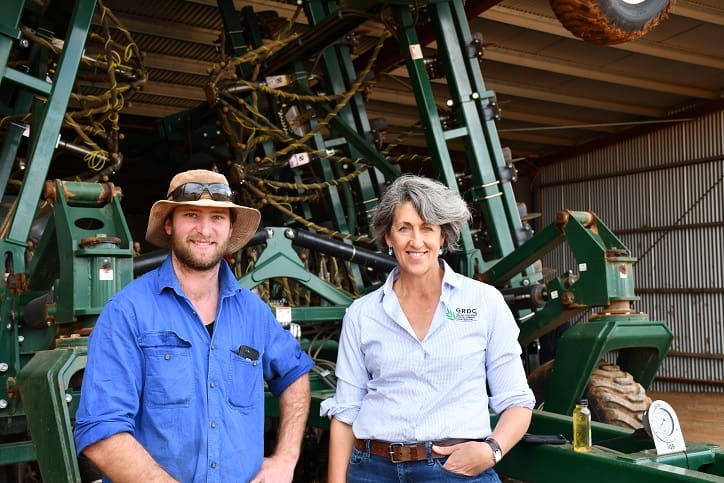
NSW grower Daniel Fox, Gladlea Pastoral Company, Marrar, with GRDC senior regional manager – north Gillian Meppem. (Photo: GRDC)
A graduate agronomist’s primary workspace is likely to be a paddock, but even out there it is critical to have professional skills to handle issues such as the tough conversations that sometimes have to be had with clients in tough seasons.
A new project developed especially for graduate agronomists in Queensland and New South Wales will offer newcomers to the grains sector an opportunity to boost their professional skills, as well as connect with some of the industry’s most respected consultants, farm advisers and researchers.
An initiative of the Grains Research and Development Corporation (GRDC), the ‘Boosting the capability and capacity of graduate agronomists’ project aims to provide critical ‘soft skill’ development, link graduates with relevant research resources and offer insights into how experienced advisers handle challenging situations and seasons.
GRDC senior regional manager – north, Gillian Meppem, said the project aimed to provide graduate agronomists with opportunities to build their skills, networks and knowledge so they were better equipped to meet the needs of grain growers.
“Targeted specifically at recent graduate agronomists and advisers in Queensland and New South Wales, this investment is also designed to ensure graduates can effectively access the GRDC’s resources which detail scientifically robust, validated research for the Australian grains industry,” she said.
“A series of networking events is planned where graduate agronomists can engage with more experienced advisers to talk about the next stage in their career development and how the GRDC’s resources and tools can assist them deliver the best possible outcomes for clients.”
Ms Meppem said growers were increasingly reliant on agronomic advisers to stay abreast of new research and analyse information to inform farm decisions.
“But gaps have been identified in the professional development of graduate level agronomists and advisers entering the grains industry. As students graduate and move into the grains industry, they themselves begin to understand and identify what they don’t know,” she said.
“It can be a steep learning curve trying to ensure they provide clients with the most up-to-date, regionally relevant information whilst satisfying the requirements of new employers, which is where this project comes in.”
The project will utilise the current GRDC Grains Research Updates to stage a series of short events (breakfast or pre-dinner gatherings) to support the introduction of experienced agronomists and advisers to graduate level agronomists.
These events will be co-ordinated for GRDC by agribusiness communication and management specialists Seedbed Media.
GRDC Northern Panel chair, John Minogue, who is also a grower and a private consultant, said the project had been developed in response to industry calls for increased professional development opportunities for those in the early stages of their agronomy careers.
“Starting work can be an isolating time for graduates accustomed to being surrounded by peers in a university environment,” Mr Minogue said.
“This initiative aims to overcome that isolation by providing access to information, offering graduates a secure online forum to ask for advice and giving them a chance to meet with and hear from some of the best in our business and form linkages that will assist them for years to come.
“One of the key components of this initiative is the involvement of experienced and well-respected advisers who will be invited to participate in short panel sessions to share ‘what they wished they’d known when they started out’ as well as identify areas where they believed graduates could benefit from improved skills.”
Events for graduate agronomists will be held in conjunction with the GRDC Grains Research Updates on:
- November 27 – Capella, Qld, Capella Cultural Centre from 3-5pm
- February 18 and 19 – Wagga Wagga, NSW
- February 25 and 26 – Dubbo, NSW
- March 3 and 4 – Goondiwindi, Qld
- March 10 – Barellan, NSW
The two-hour, free events will include a short presentation on topics such as difficult conversations and conflict management or negotiation, followed by a Q&A panel session with experienced agronomists or advisers and then networking opportunities.
Source: GRDC
For more information, email [email protected]

HAVE YOUR SAY